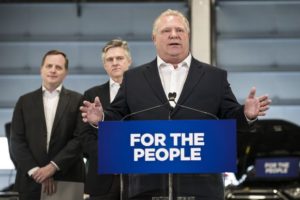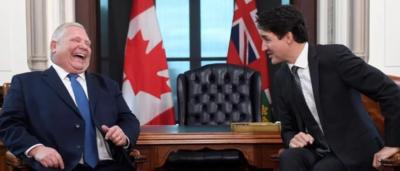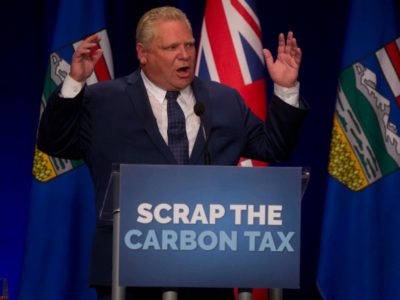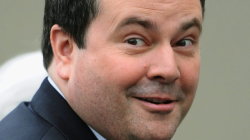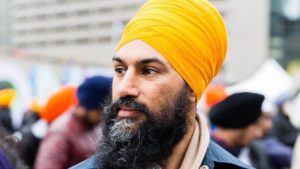December 4th, 2019
BURLINGTON, ON
Parliament and the Government of Canada are committed to the principle of making equalization payments to ensure that provincial governments have sufficient revenues to provide reasonably comparable levels of public services and reasonably comparable levels of taxation. (Constitution Act of 1982)
The communique read ‘Premiers United” but it was hardly a love-in when the provincial leaders of this great country got together at the invitation of Ontario premier Ford this week. Mr. Ford apparently had an epiphany as he watched the federal Tory leader, Mr. Scheer, fall on his own dagger. It is a different dagger than the one Mr. Ford’s provincial predecessor fell on. But there is an inscription carved in a snow bank at the back of Brampton’s city hall – Et tu Brute?
Indeed, given the circumstances of Mr. Ford’s meteoric rise to leader of the Ontario Conservatives, there may soon be an opportunity for the job he really covets.
So no longer the national disrupter, that role having been usurped by messers Kenney, Moe and Pallister, Ford has donned a new persona. He now fancies himself the national bridge builder, not literally of course. Even Ford gets that being nasty and confrontational, the way Mr. Scheer was during the last campaign, is a proven recipe for failure. So today it’s ‘Mr. Nice Guy’ and tomorrow it’s the yellow brick road to leadership of the federal Tories.
It may not be just personal ambition. After all, national conciliator is a role which Ontario has played since confederation, most recently with Robarts, Davis and Peterson, leading the we’re-all-in-this-together charge. And Trudeau, having lost most of his battalion of liberally-minded provincial leaders since his 2015 election triumph, is hardly in a position to refuse Ford’s help.
So his kiss and make-up encounter with Mr. Trudeau under his belt, Ford clearly is out to charm the other provincial and territorial leaders, to get them to put aside the differences among them and to help him unify the nation. And nothing can unify a gaggle of subnational leaders more than a chance to pile on with grievances about the federal government. That is providing they can avoid the other big issues which might pit one premier against another.
So there was nothing in the communique about Quebec’s controversial secularism Bill 21, which had provoked a war of words… and more… between Quebec and the high and mighty Manitoba premier, who somehow thinks it is his business to intervene in an internal Quebec provincial matter.
Nor was there any mention of Alberta and Saskatchewan potentially ramming pipelines full of diluted bitumen through Quebec and B.C. to the coasts to pacify Alberta, there were a few statements about resource development with some less than subtle references to Canada’s environment assessment law. And despite Quebec Premier Legault’s objection to the increased production of what he calls ‘dirty oil’, he would sign onto anything that limited and constrained federal powers.
There was no mention of the carbon tax, despite four provinces taking the federal government to various courts, including the Supreme Court, over that policy. And neither was there anything but a passing comment around climate change, the most important national issue which faced voters in the last federal election. It appears nobody wanted to provoke a stand off between the climate deniers and delayers and the other folks who actually understand the issue.
And although Albertans have been recently venting about the unfairness of Canada’s federal-provincial equalization program, there is no inkling that the premiers even discussed it. They did spend some quality time trying to fine tune the Fiscal Stabilization Program, an equally complicated multi-year mechanism intended to help provinces through rough economic patches. And as one would expect from kids in a candy store their fix was to simply demand more. Like equalization, this is federal money – somebody else is paying, right?
Equalization is one of the glues that keeps this nation together. It’s been a fundamental part of Canada since confederation though it was only formalized in 1957. And while Pierre Trudeau may have held the pen as it was being written into Canada’s 1982 constitution, equalization was initiated, formalized and most recently amended all by Conservative governments. And those last amendments which, in fact, expanded the benefits of the program to Quebecers were penned by Stephen Harper, with Jason Kenney at the Cabinet table,.
So for Jason Kenney now to be talking of seriously downgrading or even ending equalization is two-faced hypocrisy. Of course we know it was a baseless threat to Quebec over a pipeline which will never be built. But it was also politics – what better way to fire up Albertan voters, using exactly the same kind of tactic Quebec separatists have employed for decades.
Alberta is by far the wealthiest province with the greatest fiscal capacity in the country and also the one with the lowest taxes. Per capita income is 30 to 40% greater than the Canadian average. And that has hardly changed even after the oil patch experienced its big price shock a couple of years ago.
And as for Quebec, the lion’s share of the equalization budget does go that province, but given its population Quebecers receive the smallest share per capita among all the have-not provinces. Albertans may look at Quebec with some envy though. After all, it has balanced its budget. That has to do with its fiscal management and its degree of taxation, almost twice as much as Albertans pay. And unlike Alberta, the province also manages both a child care and pharmacare program.
Quebec’s pharmacare program, implemented in 1997, is a two-tiered system, similar to Ontario’s OHIP+ (youth pharmacare) – except it applies to all ages of Quebecers. It has received accolades from the Fraser institute claiming it “offers better drug coverage and quicker approval for new drugs coming to market than the rest of Canada.” In fact the plan covers twice as many pharmaceuticals as Ontario does.
But drug costs are higher and rising rapidly, particularly for the public tier of the ledger. Canada’s expert panel on pharmacare rejected the Quebec model, recommending a single payer system as a more efficient (lower cost) and sustainable option. In any case, some premiers, such as Manitoba’s Pallister, aren’t willing to even entertain the notion of a universal pharmacare program.
Pallister, much like Ontario’s Ford, has an intractable problem with hallway medicine in his province’s hospital wards. And like Ford, his prescription is turbulent restructuring, cost-cutting and eliminating health care jobs. So Pallister, like Ford is looking for more federal money to get him out of the pickle jar in which he has placed himself. That is a negotiating tactic – he’ll not agree to pharmacare unless it comes with a Santa-sled of new cash.
Quebec, and possibly Alberta, can be expected to opt out of any national pharmacare program, regardless that the alternative would be more costly. So getting to a universal pharmacare program across the country may be as much of a pipe dream as Mr. Kenney piping his province’s diluted bitumen across la belle province. Still pharmacare was at least given honourable mention in the final meeting communique. And it is the gun which Mr. Singh is holding to the prime minister’s head.
The next step in Mr. Ford’s unifying process involves the premiers meeting with Mr. Trudeau. But nobody should hold their breath waiting for any kind of unity coming out of that meeting either. If you do you might end up in one of Mr. Pallister’s hospital hallways.
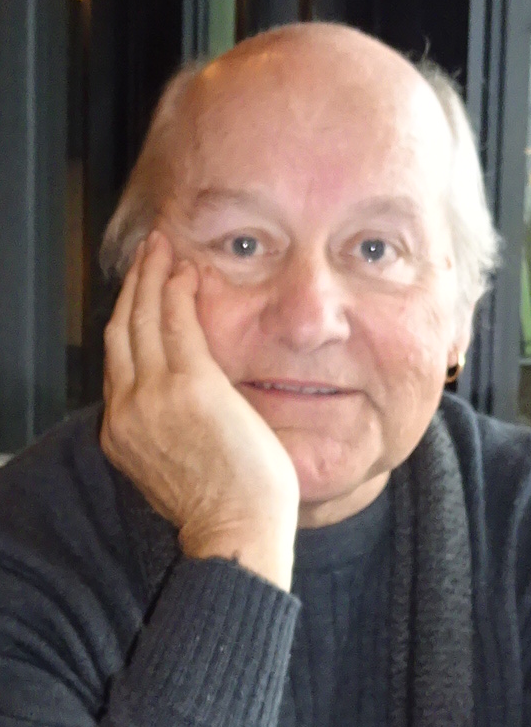 Ray Rivers writes regularly on both federal and provincial politics, applying his more than 25 years as a federal bureaucrat to his thinking. Rivers was once a candidate for provincial office in Burlington. He was the founder of the Burlington citizen committee on sustainability at a time when climate warming was a hotly debated subject. Ray has a post graduate degree in economics that he earned at the University of Ottawa. Tweet @rayzrivers
Ray Rivers writes regularly on both federal and provincial politics, applying his more than 25 years as a federal bureaucrat to his thinking. Rivers was once a candidate for provincial office in Burlington. He was the founder of the Burlington citizen committee on sustainability at a time when climate warming was a hotly debated subject. Ray has a post graduate degree in economics that he earned at the University of Ottawa. Tweet @rayzrivers
Background links:
Premiers’ Meeting – Fiscal Stabilization – Alberta Economic Stats –
More Economics – Equalization – Kenney Equalization – Quebec Drug Plan –















